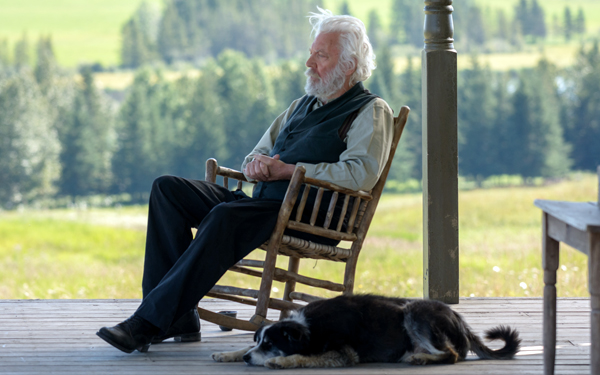By Matthew Wade Reynolds.

Brad Mirman
When 24 star Kiefer Sutherland happened upon the idea of co-starring with his legendary father Donald Sutherland for the first time in their careers (they’ve appeared in the same film on occasion, including 1996’s A Time to Kill, but not together) he turned to a trusted friend and collaborator, writer Brad Mirman.
The result, Forsaken, directed by Jon Cassar and also starring Demi Moore, is a decidedly old-fashioned, if bloody Western (the best combination, usually), with the younger Sutherland as John Henry Clayton, a former gunslinger back from the Civil War to make amends with his widower father, Reverend Clayton, only to clash with thugs led by Gentleman Dave Turner (Michael Wincott) who intimidate homesteaders unwilling to sell to land baron James McCurdy (Brian Cox).
Mirman discussed with Creative Screenwriting his long friendship with the Sutherlands, his disdain for outlines and notecards, and the importance of knowing when to pick your battles on set.

Kiefer Sutherland as John Henry Clayton in Forsaken. Photo credit: Momentum Pictures © 2015.
Everyone’s familiar with famous actor-director pairings: De Niro and Scorsese, Sam Jackson and Tarantino – it feels refreshing to hear about an actor-writer friendship!
I met Kiefer in 1996 or ‘97 when did the movie Truth or Consequences, N. M. Usually everybody’s kind of friendly on the set and then go their own way. But Kiefer and I stayed friends for 20 years now. This is the third thing we’ve done together. About eight years ago he came to me and said, “I really want to do something with my dad, we’ve never been onscreen together.” And we started kicking around ideas and Kiefer said, “What about a western?”
We started spitballing ideas back and forth, one about a gunslinger guy who goes off to war and comes back to his small town where his father is a reverend. I really liked the idea. You’ve got characters who are opposites – and it’s all about conflict when you’re doing drama.
What’s it like writing a script with actors in mind – does it help or distract?
Well that’s always been a sticking point. I don’t really know that it affects me when I’m writing. I don’t believe it’s my job as the writer to tailor the script. Even though I know Kiefer Sutherland and Donald Sutherland are going to be in the movie, I write John Henry Clayton and I write Reverend Clayton – it’s their job to become these characters.

Kiefer Sutherland as John Henry Clayton and Donald Sutherland as Reverend William Clayton in Forsaken. Photo credit: Momentum Pictures © 2015.
So it’s not a matter of hearing their voices as you’re crafting dialogue?
Again, no. I think it’s a mistake, because it’s a disservice to the character. In the development phase too, if you’ve gone out of your way to tailor this role to an actor, then the actor drops out, now what are you going to do?
If you’re thinking, I don’t think this actor can pull this off, or I’ve never seen this actor do this kind of thing in a movie before so I’m not going to write it, you’re not doing your best work.
Kiefer Sutherland doesn’t speak like John Henry, and Donald Sutherland doesn’t speak like Reverend Clayton. When I was writing them, or Gentleman Dave Turner, Michael Wincott’s character, who is incredible in this movie – you stand there, having these conversations and your housekeeper is looking at this crazy guy in the corner talking to himself.
Do you talk it out?
Sometimes hearing it in your head and saying it out loud doesn’t sound the same. There is a line in the movie that got cut out, where two gunslingers come up to Kiefer and he says, “Say what you’ve come to say,” and they say, “We’re gettin’ to it,” and he goes, “No, you’re talking around it. Advance the subject or move the f—away.” For me, when that hits my ears like that – “Advance the subject” – that’s such a bold way of speaking that I say it out loud to hear how it really sounds.

Kiefer Sutherland as John Henry Clayton in Forsaken. Photo credit: Momentum Pictures © 2015.
Some writers pride themselves on research and authenticity, while others favor pure imagination. How do you go about setting up this western world?
I’ve never been too big on tons and tons of research. My process of writing this is a little different than most other writers I know. I get an idea and a live with it for three or four weeks. I’m jotting down notes: this scene is going to happen somewhere, and so on. Then when I get ready to write, it’s almost like giving birth.
Every script that I‘ve ever sold, or optioned, or got made, that first draft comes out of me really fast. By fast I mean three or four weeks and it’s done. And then I step away. When I come back I’ve got a blueprint of where I want to go.
With so many warnings about page count, it’s easy for beginning writers to worry over length – how do your first drafts stack up?
It’s kind of hard to say – I make notes in Movie Magic as I go, so even if I wanted to, I can’t tell what the page length is when I’m writing. Obviously if my first draft comes in and it’s 130 pages I know that I’m going to have to cut it somewhere.
Do you follow a tight outline?
I have friends of mine, who, when they write, everything is completely thought out, three-by-five cards on the wall, a full outline – I’ve always felt that’s incredibly limiting. I think that some of the best surprises, the best twists in the story, come from the characters who lead you there. If you’re locked into an outline, you’re not leaving yourself room to go on this experience.

Director Jon Cassar on set of Forsaken. Photo credit: Momentum Pictures © 2015.
The film paints a stark but elegant portrait of a strained father-son relationship. Forgive the personal question, but did you draw on your own life for inspiration?
That was my relationship with my father when I was young: I was rebellious, we had a lot of turbulence. I was always trying to be seen in my father’s eyes, and to some extent, Kiefer and Donald have that relationship too.
What’s the line, Mark Twain said – I’m probably paraphrasing horribly here – when I was 21, I thought my father was an idiot, by the time I was 40 I was surprised at how smart he had become. My father is still alive, is 85 and he’s my best friend. But it wasn’t always that way.
In a town where it’s celebrated when writers hit it big when they’re barely out of school, you had a much longer route.
I didn’t start writing my first script until I was 37.

Brian Cox as James McCurdy in Forsaken. Photo credit: Momentum Pictures © 2015.
That’s amazing and inspiring in it’s own way. What did you do before?
As little as possible. (laughs) I lived in Europe for awhile, bouncing around, playing guitar. I went over there to write a novel but never wrote a word. I came back, worked at a record store, made a little bit of money in real estate and said I’m going to take this money and go off and see if I can write a screenplay. And I wrote my first screenplay and I was lucky enough to option it, not for a lot of money, and I wrote a second one, and I optioned that, then I wrote a third one (Partners in Crime) and it ended up getting into a huge bidding war between Fox and Disney and Paramount. Oddly enough they never made the movie. But it was a lot of money, back then – for someone who was getting kicked out because he couldn’t pay the rent.
That jumpstarted your career?
It was a validation. People want to meet you and they offer you a development deal and read stuff that you’ve written. The next thing I wrote after that was Knight Moves, with Christopher Lambert and Diane Lane, and then Body of Evidence, with Madonna and Willem Dafoe.

Madonna as Rebecca Carlson in Body of Evidence
Do you think the life you led before you started writing had a positive impact on your material?
That’s a good question. The honest answer is I don’t know! Someone once asked me, “What makes a good writer?” I had to think about it. “Talent” is not the right word, because how do you define what talent is? For me a much better word is “judgment.” At the end of the day, if you think I’m a good writer it’s because you agree with my judgment. If I’m writing something I think is scary, then you’re scared. If I’m writing something that I think is funny, you’re agreeing with my judgment that it’s funny.
How do you handle it when changes are suggested or made to your script?
The best advice I got was from a producer early in my career who told me that a scene I loved was not going to be in the movie. I told him it’s a good scene and he said, “No, Brad, it’s a great scene – but not in this movie.”
Now there’s two schools of thought. One is that you can really fight for it and scream that you can’t change my words – but then you’re going to be banished. You’re not going to be in any position to protect anything else you’ve done. Whereas if you give away some little stuff, you’re in a much better position to make a case and actually be heard, because you’ve shown you can be a team player.
Since everything seems to begin with the screenwriter, why do you think they have so little power?
Everybody in a movie has their moment of power – for the writer it starts at the beginning but ends the earliest.

Michael Wincott as Dave Turner in Forsaken. Photo credit: Momentum Pictures © 2015.
What’s next for you?
I’ve been orchestrating a documentary on a charity called the Disabled Soldiers Fund. We take disabled veterans and teach them how to scuba dive. We bring them to warm water locations and give them the trip of their lives, put them in a social environment. The site is dsscubafund.org. I’ve been very involved in that.
Even though screenwriting is a job, and a business, you’ve mentioned the importance of passion, and love for the world you’ve created.
It’s really hard to write if you’re not in love with that world – if you’re not sleeping with a tape recorder and making notes, if you’re not getting up every morning and bee-lining right to the keyboard and if you’re not a little bit sad when it’s over, depending on your emotional investment with these characters. It’s been a part of your life for weeks and months now, and once you write, “Fade out,” you’re probably never going to visit them in that intimate way again.

